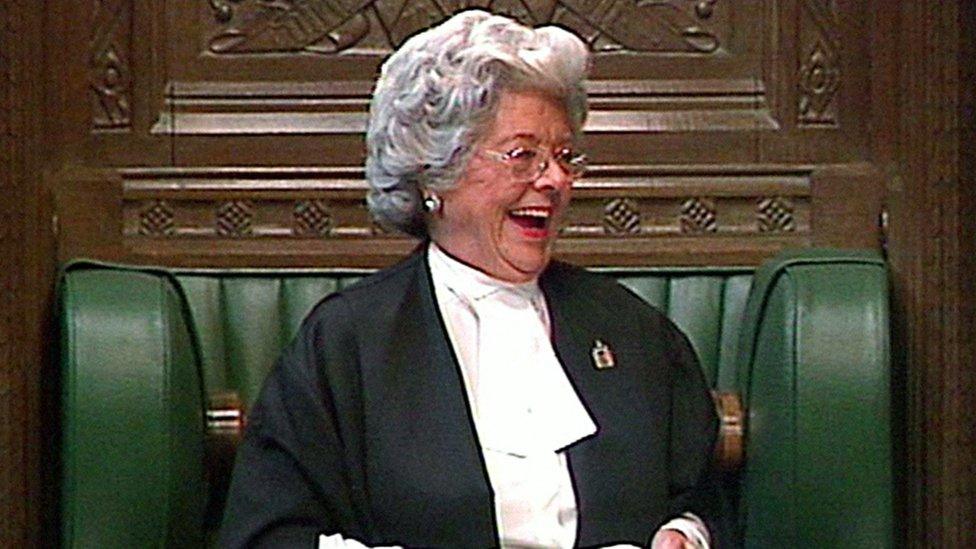Betty Boothroyd: What does the Speaker of the House of Commons do?
- Published
- comments

Betty Boothroyd was the Speaker of the House of Commons in the 1990s
The first female Speaker of the House of Commons, Betty Boothroyd, has died aged 93.
Betty served as Speaker from 1992 to 2000, before going on to become a baroness in the House of Lords from 2001.
Prime Minister Rishi Sunak described her as a "remarkable woman" with "passion, wit and sense of fairness".
The Speaker of the House of Commons is a very important job in Parliament and the current Speaker is Sir Lindsay Hoyle.
To find out more about the job of Speaker read on.
The Â鶹ԼÅÄ's Chris Mason explains the role of the Speaker
What is the Speaker of the House of Commons?
The Speaker of the House of Commons is one of the biggest jobs in British politics.
He or she chairs debates between Members of Parliament (MPs). They keep order and call MPs up to speak.
They also represent the House of Commons to the King, the House of Lords and other authorities, and have three deputies.
Sir Lindsay Hoyle - Since 2019. Told MPs to "Shut up!" when they were talking over Prime Minister Boris Johnson.
John Bercow - 2009-2019. Famous for shouting "ORRRDDDDDERRR" to try and calm MPs down in debates.
Michael Martin. 2000-2009. Was one of the first to not wear an old fashioned wig and stockings as Speaker.
Betty Boothroyd. 1992-2000. The first woman Speaker.
How is the Speaker chosen?
The role of the Speaker goes to an MP who is decided in a secret vote of their fellow MPs.
They are elected on the first day a new Parliament comes together or after a Speaker has resigned.
The Speaker must remain impartial at all times. That means they cannot take sides.
When elected, they must resign from their political party and stay separate from political issues - even after they retire.
Current Speaker, Sir Lindsay Hoyle, in the House of Commons during Prime Minister's Questions
What powers does the Speaker have?
The Speaker has a powerful role in the House of Commons.
They can ask an MP to withdraw remarks if they think it's inappropriate and tell MPs to be quiet so opinions can be heard.
They can suspend MPs who misbehave and even call off a debating session if things get really out of hand.
They can also choose which amendments can be debated in the House of Commons.
Democracy - how is the UK run?
Why is it such a tough job?
Debates in the House of Commons can get very heated - especially during Prime Minister's Questions (PMQs), which is when the prime minister answers questions from MPs on Wednesdays.
MPs will often shout and jeer at each other and call each other names.
The current speaker had to call in the House of Parliament security (called The Serjeant at Arms of the House of Commons) after two Alba MPs started shouting at former Prime Minister Boris Johnson last year.
With more than 600 MPs to control, it can be hard work keeping things running smoothly.
Sir Thomas Hungerford, the first Speaker of the House of Commons
What is the history of the role of Speaker of the Commons?
The Speaker role is more than 600 years old.
The first Speaker - Sir Thomas Hungerford - was appointed in 1377, but earlier versions of the role date back to 1258.
Until the 17th Century, the Speaker was seen as working for the King or Queen. But the Speaker was often blamed if they brought news from Parliament that the monarch did not like.
Due to this, seven Speakers were executed between 1394 and 1535!
- Published5 November 2019
- Published28 February 2023
- Published18 March 2019
